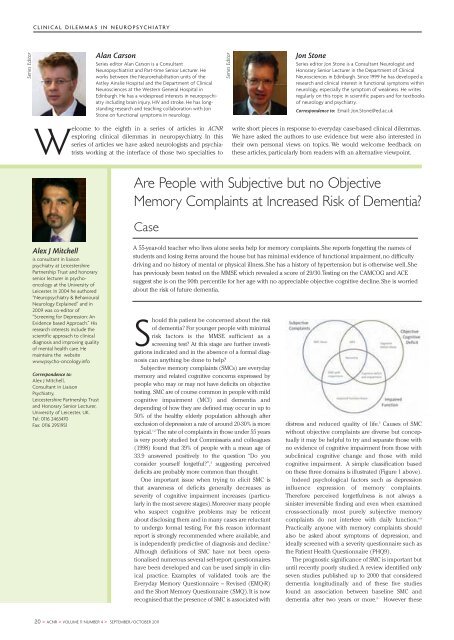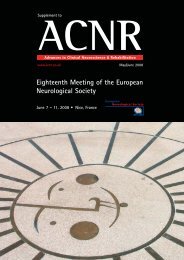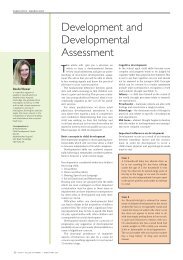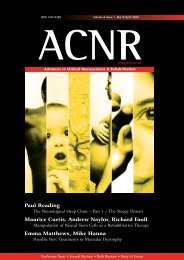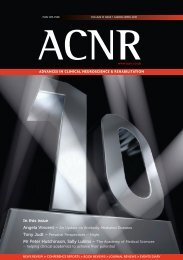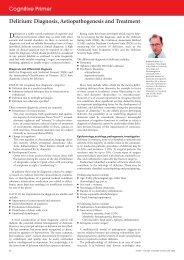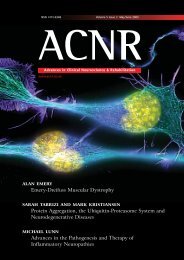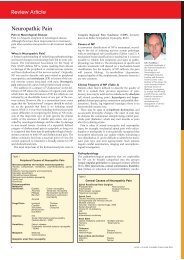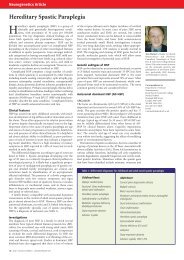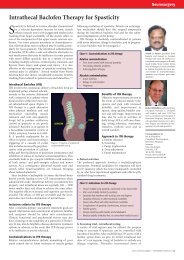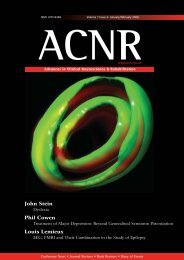Create successful ePaper yourself
Turn your PDF publications into a flip-book with our unique Google optimized e-Paper software.
CLINICAL DILEMMAS IN NEUROPSYCHIATRYSeries EditorAlan CarsonSeries editor Alan Carson is a ConsultantNeuropsychiatrist and Part-time Senior Lecturer. Heworks between the Neurorehabiltation units of theAstley Ainslie Hospital and the Department of ClinicalNeurosciences at the Western General Hospital inEdinburgh. He has a widespread interests in neuropsychiatryincluding brain injury, HIV and stroke. He has longstandingresearch and teaching collaboration with JonStone on functional symptoms in neurology.Series EditorJon StoneSeries editor Jon Stone is a Consultant Neurologist andHonorary Senior Lecturer in the Department of ClinicalNeurosciences in Edinburgh. Since 1999 he has developed aresearch and clinical interest in functional symptoms withinneurology, especially the symptom of weakness. He writesregularly on this topic in scientific papers and for textbooksof neurology and psychiatry.Correspondence to: Email: Jon.Stone@ed.ac.ukWelcome to the eighth in a series of articles in <strong>ACNR</strong>exploring clinical dilemmas in neuropsychiatry. In thisseries of articles we have asked neurologists and psychiatristsworking at the interface of those two specialties towrite short pieces in response to everyday case-based clinical dilemmas.We have asked the authors to use evidence but were also interested intheir own personal views on topics. We would welcome feedback onthese articles, particularly from readers with an alternative viewpoint.Are People with Subjective but no ObjectiveMemory Complaints at Increased Risk of Dementia?CaseAlex J Mitchellis consultant in liaisonpsychiatry at LeicestershirePartnership Trust and honorarysenior lecturer in psychooncologyat the University ofLeicester. In 2004 he authored“Neuropsychiatry & BehaviouralNeurology Explained” and in2009 was co-editor of“Screening for Depression: AnEvidence based Approach.” Hisresearch interests include thescientific approach to clinicaldiagnosis and improving qualityof mental health care. Hemaintains the websitewww.psycho-oncology.infoCorrespondence to:Alex J Mitchell,Consultant in LiaisonPsychiatry,Leicestershire Partnership Trustand Honorary Senior Lecturer,University of Leicester, UK.Tel: 0116 2463470Fax: 0116 2951951A 55-year-old teacher who lives alone seeks help for memory complaints. She reports forgetting the names ofstudents and losing items around the house but has minimal evidence of functional impairment, no difficultydriving and no history of mental or physical illness. She has a history of hypertension but is otherwise well. Shehas previously been tested on the MMSE which revealed a score of 29/30. Testing on the CAMCOG and ACEsuggest she is on the 90th percentile for her age with no appreciable objective cognitive decline. She is worriedabout the risk of future dementia.Should this patient be concerned about the riskof dementia? For younger people with minimalrisk factors is the MMSE sufficient as ascreening test? At this stage are further investigationsindicated and in the absence of a formal diagnosiscan anything be done to help?Subjective memory complaints (SMCs) are everydaymemory and related cognitive concerns expressed bypeople who may or may not have deficits on objectivetesting. SMC are of course common in people with mildcognitive impairment (MCI) and dementia anddepending of how they are defined may occur in up to50% of the healthy elderly population although afterexclusion of depression a rate of around 20-30% is moretypical. 1,2 The rate of complaints in those under 55 yearsis very poorly studied but Commissaris and colleagues(1998) found that 39% of people with a mean age of33.9 answered positively to the question “Do youconsider yourself forgetful?”, 3 suggesting perceiveddeficits are probably more common than thought.One important issue when trying to elicit SMC isthat awareness of deficits generally decreases asseverity of cognitive impairment increases (particularlyin the most severe stages). Moreover many peoplewho suspect cognitive problems may be reticentabout disclosing them and in many cases are reluctantto undergo formal testing. For this reason informantreport is strongly recommended where available, andis independently predictive of diagnosis and decline. 4Although definitions of SMC have not been operationalisednumerous several self-report questionnaireshave been developed and can be used simply in clinicalpractice. Examples of validated tools are theEveryday Memory Questionnaire – Revised (EMQ-R)and the Short Memory Questionnaire (SMQ). It is nowrecognised that the presence of SMC is associated withdistress and reduced quality of life. 5 Causes of SMCwithout objective complaints are diverse but conceptuallyit may be helpful to try and separate those withno evidence of cognitive impairment from those withsubclinical cognitive change and those with mildcognitive impairment. A simple classification basedon these three domains is illustrated (Figure 1 above).Indeed psychological factors such as depressioninfluence expression of memory complaints.Therefore perceived forgetfulness is not always asinister irreversible finding and even when examinedcross-sectionally most purely subjective memorycomplaints do not interfere with daily function. 6 8Practically anyone with memory complaints shouldalso be asked about symptoms of depression, andideally screened with a severity questionnaire such asthe Patient Health Questionnaire (PHQ9).The prognostic significance of SMC is important butuntil recently poorly studied. A review identified onlyseven studies published up to 2000 that considereddementia longitudinally and of these five studiesfound an association between baseline SMC anddementia after two years or more. 9 However these20 > <strong>ACNR</strong> > VOLUME 11 NUMBER 4 > SEPTEMBER/OCTOBER 2011


